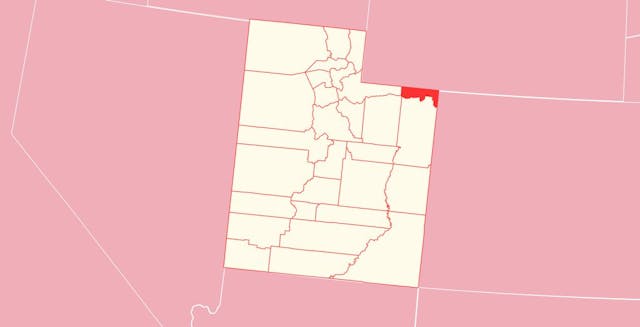Rehabs in Daggett
Daggett County is located in the northeastern corner of the US state of Utah. The region's center is Manila. According to the 2020 US Census, the region had a population of 935, making it the least populous province in UT.
Drug and alcohol abuse causes a series of serious problems in the state of Utah. As of the National Survey on Drug Use and Health (NSDUH), almost 6% of Utah residents reported using illegal substances during the past month. As of the report made by WONDER, in 2009 the number of drug-induced fatalities was 508. This rate is even higher than the number of motor vehicle accidents (256).
This province has its unique substance abuse challenges as well. So, since the early 2000s, this region has seen an increasing necessity for addiction treatment centers. Maybe there is not a wide range of rehabs in Daggett County, however, you still can find professional support nearby.
Read the article, to get information on available recovery centers and the services that they offer.
Available Treatment Options
You can’t find a variety of rehabs in Daggett County, however, there are many rehabs accessible in UT. They suggest such recovery programs, as:
- Detoxification
- Inpatient and Outpatient programs
- Aftercare
Commonly abused substances in UT are heroin, marijuana, amphetamines and stimulants, and prescription drugs.
Detox
When entering a recovery clinic, you will not have access to drugs and alcohol anymore. Accordingly, the licensed team of experts will determine which kind of medication and therapies you will need during detox. As your body is being cleaned from toxic substances, you are to experience withdrawal symptoms. The emotional and medical assistance from the staff will make the withdrawal procedure comfortable for you. Detox lasts from 7 to 10 days, and after finishing it, you can enter a treatment program and keep your newfound sobriety.
Inpatient Care
This program includes highly structured therapies and services and requires the patient’s stay at the facility which ensures a substance-free environment. The patient is to receive 24/7 therapeutic support and medical care. Inpatient care suits those with severe addictions and co-occurring mental and behavioral disorders. The length of the program depends on the severity of the issue. So, it may last from a month to three months or even a year. The average cost is between $20,000 and $50,000.
Outpatient Care
The outpatient program also includes comprehensive drug and alcohol recovery services. Generally, it involves effective therapies and treatments from inpatient rehab. However, the outpatient plan allows the individuals to continue to live at home and even work during the treatment. On the other hand, during the week you have to spend 10-15 hours at the hub and attend certain therapy sessions.
This type of care is effective in case of mild dependences, as here the risks of relapse are high. So, support from family and friends is also very important. The average cost of an outpatient program ranges between $5,000 and $1,000. Reputable hubs may cost even higher.
Aftercare
The real challenges arise after leaving the rehab. That is why rehabs offer individual aftercare plans to make this transition easier. Aftercare includes 12-step alternatives, sober living houses, peer support groups, alumni networks, etc.
Payment
When searching for a facility you should know that many private and public insurance agencies will give you coverage for your expenses. That means, recognition of dependency as a medical disease, and insurance agencies are more willing to support you with the price of the hub. Find a recovery hub and verify your insurance with them.
If you don’t have insurance, you can enter low-income or state-funded clinics. Just check your eligibility, as they have specific criteria to math with. Other financial options may be medical loans, scholarships, grants, and financial help from family and friends.
To get more information on the details of addiction therapies, costs, and payment methods, you can contact SAMHSA (Substance Abuse and Mental Health Services Administration) by calling 1-877-726-4727.

